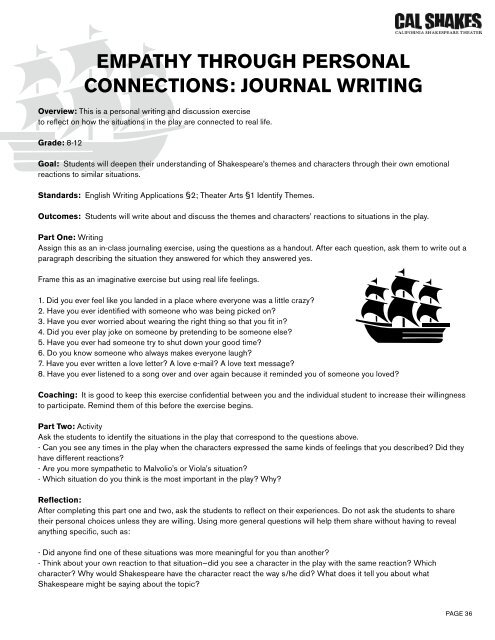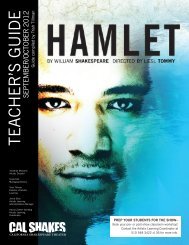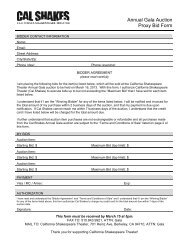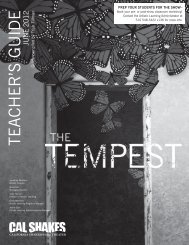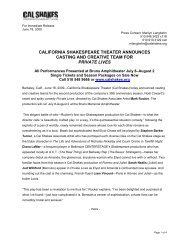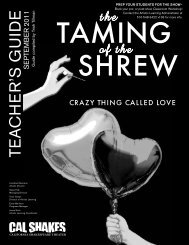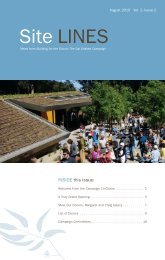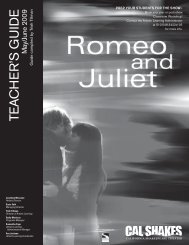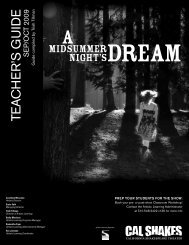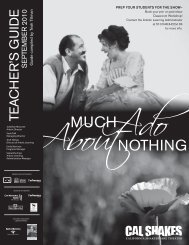Twelfth Night teacher's guide - California Shakespeare Theater
Twelfth Night teacher's guide - California Shakespeare Theater
Twelfth Night teacher's guide - California Shakespeare Theater
Create successful ePaper yourself
Turn your PDF publications into a flip-book with our unique Google optimized e-Paper software.
Empathy Through Personal<br />
Connections: Journal Writing<br />
Overview: This is a personal writing and discussion exercise<br />
to reflect on how the situations in the play are connected to real life.<br />
Grade: 8-12<br />
Goal: Students will deepen their understanding of <strong>Shakespeare</strong>’s themes and characters through their own emotional<br />
reactions to similar situations.<br />
Standards: English Writing Applications §2; <strong>Theater</strong> Arts §1 Identify Themes.<br />
Outcomes: Students will write about and discuss the themes and characters’ reactions to situations in the play.<br />
Part One: Writing<br />
Assign this as an in-class journaling exercise, using the questions as a handout. After each question, ask them to write out a<br />
paragraph describing the situation they answered for which they answered yes.<br />
Frame this as an imaginative exercise but using real life feelings.<br />
1. Did you ever feel like you landed in a place where everyone was a little crazy?<br />
2. Have you ever identified with someone who was being picked on?<br />
3. Have you ever worried about wearing the right thing so that you fit in?<br />
4. Did you ever play joke on someone by pretending to be someone else?<br />
5. Have you ever had someone try to shut down your good time?<br />
6. Do you know someone who always makes everyone laugh?<br />
7. Have you ever written a love letter? A love e-mail? A love text message?<br />
8. Have you ever listened to a song over and over again because it reminded you of someone you loved?<br />
Coaching: It is good to keep this exercise confidential between you and the individual student to increase their willingness<br />
to participate. Remind them of this before the exercise begins.<br />
Part Two: Activity<br />
Ask the students to identify the situations in the play that correspond to the questions above.<br />
- Can you see any times in the play when the characters expressed the same kinds of feelings that you described? Did they<br />
have different reactions?<br />
- Are you more sympathetic to Malvolio’s or Viola’s situation?<br />
- Which situation do you think is the most important in the play? Why?<br />
Reflection:<br />
After completing this part one and two, ask the students to reflect on their experiences. Do not ask the students to share<br />
their personal choices unless they are willing. Using more general questions will help them share without having to reveal<br />
anything specific, such as:<br />
- Did anyone find one of these situations was more meaningful for you than another?<br />
- Think about your own reaction to that situation—did you see a character in the play with the same reaction? Which<br />
character? Why would <strong>Shakespeare</strong> have the character react the way s/he did? What does it tell you about what<br />
<strong>Shakespeare</strong> might be saying about the topic?<br />
PAGE 36


